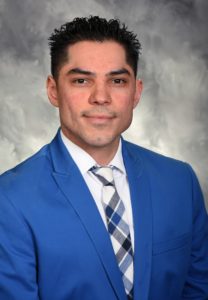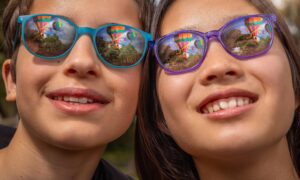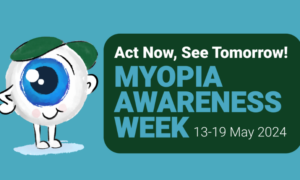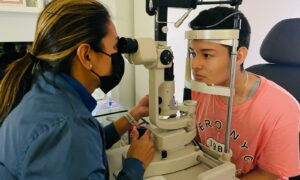March 1, 2023
By Vittorio Mena OD, MS

Subjective
Two children, accompanied by their parents, presented at my clinic for comprehensive eye examinations. The son stated he had trouble seeing far away and had never had an eye examination. The daughter also had trouble seeing at distance, and her teacher had to move her to the front of the class. The mother was concerned that her daughter’s prescription kept getting higher and higher since the last time they visited an optometrist, especially since the mother never wore glasses before and her husband only had a very low prescription. The mother wondered if anything could be done to slow down the myopia progression. They came to see me for the first time on October 2, 2020.
Objective
11-year-old, Female, Hispanic
April 12, 2018
OD: -1.50 DS
OS: -1.00 -0.50 x 165
August 6, 2019
OD: -2.00 DS
OS: -1.50 -0.50 X165
October 2, 2020: First Visit with Dr. Mena (VA w/o glasses 20/400 OU)
Cycloplegic refraction:
OD: -3.25 DS
OS: -3.00 -0.75 X165
Final Rx Given:
OD: -3.25 DS
OS: -3.00 -0.75 X165
Slit Lamp Findings: Within normal limits.
Intraocular Pressure: OD 13; OS 14
Fundus Exam: CD .2/.2 OU
Binocular Vision: Ortho @ Distance and 5 exophoria @ Near
Axial Length: Unable to test (No optical biometer in office)
8-year-old, Male, Hispanic (first eye exam ever)
October 2, 2020: (VA w/o glasses OD: 20/20-2; OS 20/70)
Cycloplegic Refraction:
OD: PL -1.50 x 175
OS: -1.50 DS
Final Rx Given:
OD: PL -1.50 x 175
OS: -1.50 DS
Slit Lamp Findings: Within normal limits.
Intraocular Pressure: OD 15; OS 15
Fundus Exam: CD .3/.3 OU
Binocular Vision: Ortho @ Distance and 6 exophoria @ Near
Axial Length: Unable to test (No optical biometer in office)
Assessment
The daughter’s prescription became more nearsighted each time she visited the optometrist. Her first eye exam was in 2018, and she was given single-vision eyeglasses. We typically say an increase of -0.50sph is considered a “normal” change yearly, as in 2019. In 2020, her left eye prescription doubled, and the right eye demonstrated a -1.25 DS change.
For the son, this was his first Rx, around the same age his sister began wearing glasses.
Plan
Since the daughter had a significant prescription change, I recommended myopia management to help slow down the progression. I educated the parents and child on what would happen if their prescriptions were to continue increasing in strength and the possibilities of eye health complications in the future, such as glaucoma, myopic maculopathy, or earlier onset of cataracts. The options I proposed to them, backed by the peer-reviewed literature, were low-dose atropine, daily disposable center distance contact lenses, or orthokeratology. Since I do not offer OrthoK in my clinic, I told them I would be happy to refer them to another qualified clinician if they selected that option. The parent and child chose single-vision spectacles and 0.05% low-dose atropine to be applied daily before bed, since the daughter was uncomfortable “putting contact lenses in her eyes.”
Since the son was the same age as when his sister received her first pair of glasses, we agreed that we should do the same protocol for both children. I told the mother that the atropine would be mailed to their house from a specialty pharmacy and that we would be doing this treatment regimen for several years. I asked them to follow up with me in three months. Also, they must wear their single-vision glasses full-time and only take them off when sleeping or showering.
I also advised the parents that I prefer for their children to watch television from a distance rather than watching a show on a tablet, phone, or computer because lots of up-close activities can potentially further the progression of myopia. I also recommended that the children spend at least two hours per day playing outdoors. When both children returned for their three-month follow-up, I checked to determine if there was a change to their prescription. I also asked the children if they experienced any side effects, such as photophobia, or had any trouble seeing at a distance or near with their eyeglasses. Below are the findings for each child for their annual eye exams in 2021 and 2022.
Female, Hispanic, Sister
October 8, 2021 (Yearly exam; 12yo)
OD: -3.25 DS
OS: -3.00 -0.75 X165
November 3, 2022 (Yearly exam; 13yo)
OD: -3.25 DS
OS: -3.00 -0.75 X165
Male, Hispanic, Brother
October 8, 2021 (Yearly exam; 9yo)
OD: PL -1.50 x 175
OS: -1.50 DS
November 3, 2022 (Yearly exam; 10yo)
OD: PL -1.50 x 175
OS: -1.50 DS
Conclusion
In the following two years, the parents were delighted to know that the prescription had not changed in both children since starting 0.05% atropine. I recommended that the children continue the low-dose atropine regimen nightly until the children reach the age of 18. I also gave them the option to switch to contact lenses for myopia management instead of atropine if they wanted to in the future. They stated that they are satisfied using the atropine drops every night.
The biggest takeaway from this case is that we cannot predict which myopia management treatment will work best for an individual child. The intervention that best matches their lifestyle may be the most appropriate option to maximize treatment compliance.
 |
Dr. Vittorio Mena works as the Sports Vision Director at Optical Academy in Clifton, N.J., and works alongside the New Jersey Education Association. He also serves as an Advanced Clinical Director for the Special Olympics Lions Club International Opening Eyes program for the state of New Jersey. Dr. Mena is also on the Board of Directors of NJSOP and is a Board Member of the AOA Sports Performance Vision Section. |













